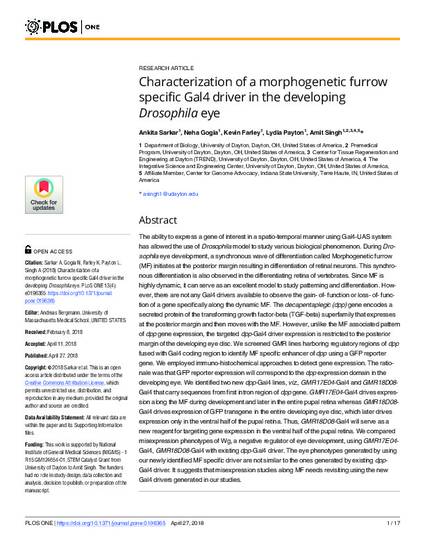
The ability to express a gene of interest in a spatio-temporal manner using Gal4-UAS system has allowed the use of Drosophila model to study various biological phenomenon. During Drosophila eye development, a synchronous wave of differentiation called Morphogenetic furrow (MF) initiates at the posterior margin resulting in differentiation of retinal neurons. This synchronous differentiation is also observed in the differentiating retina of vertebrates. Since MF is highly dynamic, it can serve as an excellent model to study patterning and differentiation. However, there are not any Gal4 drivers available to observe the gain- of- function or loss- of- function of a gene specifically along the dynamic MF. The decapentaplegic (dpp) gene encodes a secreted protein of the transforming growth factor-beta (TGF-beta) superfamily that expresses at the posterior margin and then moves with the MF. However, unlike the MF associated pattern of dpp gene expression, the targeted dpp-Gal4 driver expression is restricted to the posterior margin of the developing eye disc. We screened GMR lines harboring regulatory regions of dpp fused with Gal4 coding region to identify MF specific enhancer of dppusing a GFP reporter gene. We employed immuno-histochemical approaches to detect gene expression. The rationale was that GFP reporter expression will correspond to the dppexpression domain in the developing eye. We identified two new dpp-Gal4 lines, viz., GMR17E04-Gal4 and GMR18D08-Gal4 that carry sequences from first intron region of dppgene. GMR17E04-Gal4 drives expression along the MF during development and later in the entire pupal retina whereas GMR18D08-Gal4 drives expression of GFP transgene in the entire developing eye disc, which later drives expression only in the ventral half of the pupal retina. Thus, GMR18D08-Gal4 will serve as a new reagent for targeting gene expression in the ventral half of the pupal retina. We compared misexpression phenotypes of Wg, a negative regulator of eye development, using GMR17E04-Gal4, GMR18D08-Gal4 with existing dpp-Gal4 driver. The eye phenotypes generated by using our newly identified MF specific driver are not similar to the ones generated by existing dpp-Gal4 driver. It suggests that misexpression studies along MF needs revisiting using the new Gal4 drivers generated in our studies.
Available at: http://works.bepress.com/amit_singh/58/

Funding: This work is supported by National Institute of General Medical Sciences (NIGMS) - 1 R15 GM124654-01, STEM Catalyst Grant from University of Dayton to Amit Singh. The funders had no role in study design, data collection and analysis, decision to publish, or preparation of the manuscript.
Supporting data is available at https://ecommons.udayton.edu/dev_disease_data/